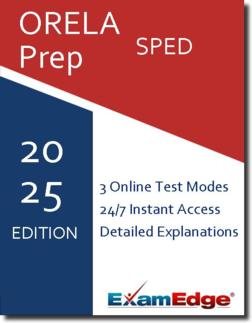ORELA Special Education (601) Practice Tests & Test Prep by Exam Edge - FAQ
Based on 17 Reviews
- Real Exam Simulation: Timed questions and matching content build comfort for your ORELA SPED test day.
- Instant, 24/7 Access: Web-based ORELA Special Education practice exams with no software needed.
- Clear Explanations: Step-by-step answers and explanations for your ORELA exam to strengthen understanding.
- Boosted Confidence: Reduces anxiety and improves test-taking skills to ace your ORELA Special Education (601).

Why should I use Exam Edge to prepare for the ORELA Special Education Exam?
FAQ's for Exam Edge ORELA Special Education practice tests
- Comprehensive content: Exam Edge's ORELA Special Education practice tests are created specifically to prepare you for the real exam. All our ORELA SPED practice test questions parallel the topics covered on the real test. The topics themselves are covered in the same proportions as the real test too, based on outlines provided by the Oregon Educator Licensure Assessments in their ORELA SPED test guidelines.
- Realistic practice: Our ORELA SPED practice exams are designed to help familiarize you with the real test. With the same time limits as the real exam, Our ORELA practice tests enable you to practice your pacing and time management ahead of test day.
- Detailed explanations: As you complete your practice tests, we show you which questions you answered correctly and which ones you answered incorrectly, in addition to providing you with detailed step-by-step explanations for every single ORELA Special Education practice exam question.
- Performance insights: After you complete a practice test, we provide you with your raw score (how many you answered correctly) and our estimate of the ORELA SPED score you would have received if you had taken the real test.
- Ease of access: Because all Our ORELA practice tests are web-based, there is no software to install. You can take ORELA SPED practice exams on any device with access to the internet, at any time.
- Flexible use: If you must pause while taking one of Our ORELA practice exam, you can continue right where you left off. When you continue the test, you will start exactly where you were, and with the same amount of time you had remaining.
- Thousands of unique questions: We offer 15 different online practice exams with 2,250 unique questions to help you prepare for your ORELA Special Education !
- Low cost: The cost of ordering 5 practice tests is less than the cost of taking the real ORELA SPED test. In other words, it would be less expensive to order 5 practice tests than to retake the real ORELA Special Education exam!
- Our trusted reputation: As a fully accredited member of the Better Business Bureau, we uphold the highest level of business standards. You can rest assured that we maintain all of the BBB Standards for Trust.
- Additional support: If you need additional help, we offer specialized tutoring. Our tutors are trained to help prepare you for success on the ORELA Special Education exam.
What score do I need to pass the ORELA SPED Exam?
To pass the ORELA Special Education test you need a score of 228.
The range of possible scores is 100 to 300.
How do I know the practice tests are reflective of the actual ORELA Special Education ?
At Exam Edge, we are proud to invest time and effort to make sure that Our ORELA practice tests are as realistic as possible. Our practice tests help you prepare by replicating key qualities of the real test, including:
- The topics covered
- The level of difficulty
- The maximum time-limit
- The look and feel of navigating the exam
Do you offer practice tests for other Oregon Educator Licensure Assessments subjects?
Yes! We offer practice tests for 28 different exam subjects, and there are 420 unique exams utilizing 45075 practice exam questions. Every subject has a free sample practice test you can try too!
ORELA Administrator
Practice Tests
ORELA Art (503)
Practice Tests
ORELA Biology (305)
Practice Tests
ORELA Business (309)
Practice Tests
ORELA Chemistry (306)
Practice Tests
ORELA Early Childhood Education (101)
Practice Tests
ORELA Earth and Space Science
Practice Tests
ORELA English Language Arts (301)
Practice Tests
ORELA English to Speakers of Other Languages
Practice Tests
ORELA Family and Consumer Sciences (310)
Practice Tests
ORELA General Science (002)
Practice Tests
ORELA Health (505)
Practice Tests
ORELA Math - Essential Academic Skills (003)
Practice Tests
ORELA Mathematics (304)
Practice Tests
ORELA Middle Grades English Language Arts (201)
Practice Tests
ORELA Middle Grades General Science (204)
Practice Tests
ORELA Middle Grades Mathematics (203)
Practice Tests
ORELA Middle Grades Social Science (202)
Practice Tests
ORELA Multiple Subjects
Practice Tests
ORELA Physical Education (506)
Practice Tests
ORELA Physics (308)
Practice Tests
ORELA Reading - Essential Academic Skills (001)
Practice Tests
ORELA School Counselor (501)
Practice Tests
ORELA School Library Media Specialist (502)
Practice Tests
ORELA Social Science (303)
Practice Tests
ORELA Spanish (401)
Practice Tests
ORELA Special Education (601)
Practice Tests
ORELA Writing - Essential Academic Skills (002)
Practice Tests
To order full-length tests, or take a sample test, for a different subject:
Click on ' Name on the Exam Name' You will be take to the orders page
How do I register for the real Oregon Educator Licensure Assessments?
For up-to-date information about registration for the Oregon Educator Licensure Assessments, refer to the Oregon Educator Licensure Assessments website.


